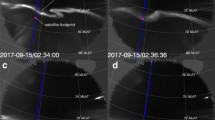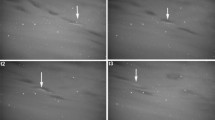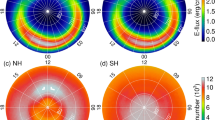Abstract
ON Saturday evening, Dec. 20, at about 18 h. 35 m., I noticed that the sky was strongly illuminated along the northern horizon, the light extending about 40° in azimuth, with its centre, as near as could be estimated from the position of the pole star, true north, and a maximum altitude of about 15°. It was at once suspected as an auroral arch, but as the magnetic curves which had come off that morning showed the magnetic conditions to be exceptionally quiet, some doubt was felt as to the auroral character of the light. A suspicion was entertained that it might be due to the illumination of a sheet of very high cloud, though the sun was far below the horizon. This, however, appeared unlikely, both from the length of time after sunset and from the fact that there was no illumination over the western or north-western horizon.
This is a preview of subscription content, access via your institution
Access options
Subscribe to this journal
Receive 51 print issues and online access
$199.00 per year
only $3.90 per issue
Buy this article
- Purchase on Springer Link
- Instant access to full article PDF
Prices may be subject to local taxes which are calculated during checkout
Similar content being viewed by others
Author information
Authors and Affiliations
Rights and permissions
About this article
Cite this article
ROWLAND, J. Aurora Display and Magnetic Disturbance. Nature 127, 89–90 (1931). https://doi.org/10.1038/127089b0
Issue Date:
DOI: https://doi.org/10.1038/127089b0
Comments
By submitting a comment you agree to abide by our Terms and Community Guidelines. If you find something abusive or that does not comply with our terms or guidelines please flag it as inappropriate.



